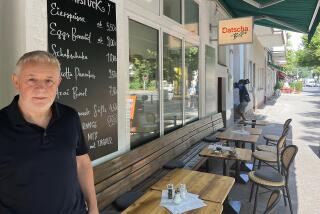EASTERN EUROPE : Ethnic Germans’ Flight From Romania a Blow to Stability and Culture
- Share via
SIBIU, Romania — In this Transylvanian heartland, which has suffered centuries of war and hardship, an 800-year-old culture has been done in by democracy.
The ethnic German minority that imparted a rare vestige of prosperity and stability to the troubled region has fled Romania en masse since the revolution a year ago.
More than half of the 220,000 Germans in Romania at the start of the year have poured through the open borders to resettle in Germany. In the absence of restrictions on travel, many of the rest are preparing to follow.
“There might have been some hope of protecting the German community in Romania if the German government had believed in it more,” said Thomas Naegler, president of the German Forum, which is trying to rescue a society that has given up. “Too many of our young people have left, especially those with the skills that would be needed to rebuild here. The breakup of our community has already occurred.”
Until dictator Nicolae Ceausescu forbade the use of German names for the seven towns and cities known collectively as Siebenbuergen (Seven Fortresses), Sibiu was known to its bustling German population as Hermannstadt. The gabled, half-timbered houses of the Old Town evoke comparison with the Rhineland, the original home of the 12th-Century settlers who made Hermannstadt their cultural center.
Germans numbered 750,000 in the greater Romania formed after World War I. But expulsions and territorial losses knocked the population down to half a million by the end of the next war, and four decades of communism gradually reduced that population by half.
Under a 1978 pact between Ceausescu and Bonn, West Germany paid bounties of about $8,000 a head for the thousands of Romanian Germans allowed to emigrate each year.
Last year’s flood of ethnic Germans from the Soviet Union and Eastern Europe has overwhelmed German hospitality and brought about more stringent standards for gaining citizenship. But the exodus from Romania hasn’t noticeably slowed.
Two of Sibiu’s five German-language schools have been forced to close for lack of students and faculty. Naegler said consolidation into one site is the only chance for ethnic education to continue.
The region around Sibiu had 100,000 Germans a quarter century ago. They now number fewer than 7,000, according to Naegler.
Siebenbuergen’s prosperity and charm have disappeared with the German population as its distinctive architecture and the Lutheran religion were all but wiped out under Communist rule.
The steady outflow of skilled workers and intellectuals constitutes a vote of no confidence in the Bucharest government, which officially decries the exodus and promises aid for projects that might entice industrious craftsmen to stay.
“This emigration is very sad, and it’s one of our foremost priorities to try to stop it,” Prime Minister Petre Roman has said.
The migration is believed to be compounding Romania’s economic decline, as industrial output had tumbled by 30% over the last year, even in the usually productive factories of Siebenbuergen.
A tiny minority of German die-hards say they will stay and fight for revival of their culture despite the steady dwindling of their ranks.
“Germans are very practical and ambitious, so they are frustrated by the slow liberalization of commerce,” said Mihai Zamfirescu, director of Bucharest’s sole German school. “I think more would stay if they could see any opportunity here.”
He has been in charge since September, when the last director emigrated, and he continues to teach history and biology because he can’t find German-speaking teachers to fill those jobs.
“I can’t think only of myself,” Zamfirescu said when asked why he hasn’t left, too. “What are my students to think if I leave them, too? If you go, you can’t fight anymore.”
More to Read
Sign up for Essential California
The most important California stories and recommendations in your inbox every morning.
You may occasionally receive promotional content from the Los Angeles Times.














